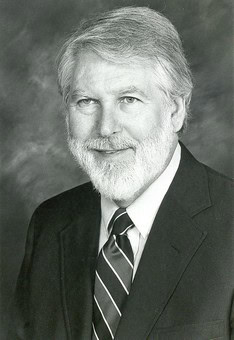
Charles Joyner
Renowned and beloved historian of the American South Charles Joyner died on September 13, 2016. He was a scholar who championed new approaches to historical analysis, a teacher who inspired, a musician connected to and fascinated by the roots of his music, and an activist dedicated to the cause of racial justice.
Joyner’s career is not easy to summarize because, to employ one of his own phrases, it “stubbornly resists synthesis.” He lived in the South most of his life—writing, teaching, and lecturing on southern history from slavery and the Civil War to segregation and the Civil Rights Movement; on southern literature from William Faulkner to William Styron, Julia Peterkin to Natasha Trethewey; on southern folk culture from tales and legends to material culture; on southern music from ballads to blues, spirituals to classical, country and bluegrass to jazz. Much of his work explored what he described as “large questions in small places.”
Joyner double-majored in history and English at Presbyterian College in Clinton, South Carolina. In 1956, he began graduate study in history at the University of South Carolina (receiving his MA in 1958), but induction into the US Army intervened. After two years of active duty, Joyner completed his PhD, a study of John Dos Passos’s participation in World War I and its impact on his literary achievements. Joyner’s cultural self-education during this period, often disclosed in late-night conversations, is the stuff of legend.
In 1963, he married Jean Dusenbury. He taught at several southern colleges before moving to St. Andrews Presbyterian College in Laurinburg, North Carolina, where he thrived for 14 years. A deepening interest in folklore and folk culture led Joyner into fieldwork on both sides of the Atlantic, and in 1975 he earned a second doctorate at the University of Pennsylvania in folklore and folklife, the only discipline, his wife joked, that paid less than history. Following a stint as a visiting professor at the University of South Carolina, in 1980 he joined the faculty of the University of South Carolina’s regional campus in Horry County, Coastal Carolina College, in the area that was also his main research interest. That research resulted in the prize-winning Down By the Riverside: A South Carolina Slave Community (1984). The original has never been out of print, and the University of Illinois Press published a 25th-anniversary edition in 2009.
After visiting appointments at the University of California, Berkeley, and the University of Mississippi, Joyner joined the tenured faculty at the University of Alabama. In 1988, he returned to Coastal Carolina as the inaugural Burroughs Distinguished Chair in Southern History and Culture. Joyner was a global ambassador for southern history and culture, encouraging audiences with heartfelt addresses and pounding on pianos everywhere he went, urging all to “study war no more.” Throughout his career he drew on the mutual traditions of southern folk culture and the sense of place in southern literature. In 1999, he published an important collection of essays, Shared Traditions: Southern History and Folk Culture.
Joyner taught at Coastal Carolina until his retirement in 2007. In 2012, the institution, now a separate state university, awarded him its first University Medallion, established a Charles Joyner Reading Room, and instituted the Charles Joyner Institute for Gullah and African Diaspora Studies.
His numerous honors and awards include the Governor’s Award for Lifetime Achievement in the Humanities and induction into the South Carolina Academy of Authors. He served as president of the Southern Historical Association and of the North Carolina Folklore Society. In 2011, Coastal Carolina University hosted a conference: “Writing the South in Fact, Fiction, and Poetry,” which resulted in the Festschrift Becoming Southern Writers: Essays in Honor of Charles Joyner (2016).
Joyner is survived by his wife, Jean Dusenbury Joyner; his son, Wesley; his daughter, Dr. Hannah Joyner; her husband, David Meyers; and Joyner’s grandson, Abraham. We have lost a truly great historian and humanitarian, and for me an even better friend. He made the world a better place. We shall not see the likes of a Chaz Joyner again.
Orville Vernon Burton
Clemson University
This work is licensed under a Creative Commons Attribution-NonCommercial-NoDerivatives 4.0 International License. Attribution must provide author name, article title, Perspectives on History, date of publication, and a link to this page. This license applies only to the article, not to text or images used here by permission.